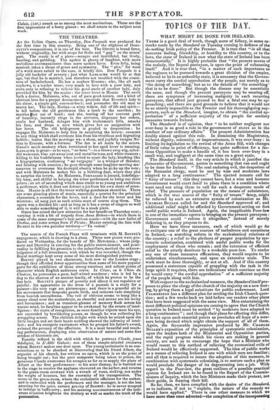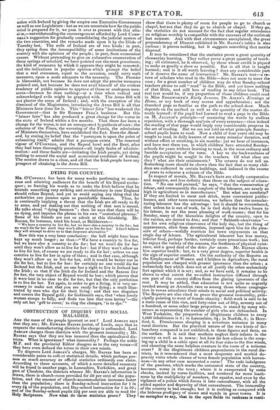TOPICS OF THE DAY.
WHAT MIGHT BE DONE FOR IRELAND.
THERE is a good deal of truth, though more of fallacy, in some re- marks made by the Standard on Tuesday evening in defence of the do-nothing Irish policy of the Premier. It is true that "in all that concerns feeling, friendship, or hostility to this country, or to the laws, the state of Ireland is now what the state of Ireland has been immemorially." It is highly probable that "the present access of the malady, the Repeal paroxysm, is upon the point of exhausting itself." And it is true that, "in a matter of such importance as the regimen to be pursued towards a great division of the empire, believed to be in an unhealthy state, it is necessary that the Govern- ment carry the cordial approbation of the people, not merely as to 'the doing of something,' but as to the details of the something' that is to be done." But though the disease may be essentially the same, and though the present paroxysm may be wearing oft; there are symptoms of increasing malignity in each recurring paroxysm, that afford just ground to fear a fatal one may be ap- proaching; and there are good grounds to believe that it would not be so utterly impossible as the Premier and his thoroughgoing sup- porters, such as the Standard, imagine, to obtain "the cordial ap- probation" of a sufficient majority of the people for sanitary measures towards Ireland.
The Standard is of opinion, that "to be neither negligent nor over-busy is as good a rule in the government of states as in the conduct of our ordinary affairs." The present Administration has doubly sinned against this rule. In dismissing the Magistrates, without dignity, solemnity, or impressiveness, it was over-busy : in limiting its legislation to the revival of the Arms Bill, with changes of little value in point of efficiency, but quite sufficient for a fac- tious Opposition to make a handle of, it has been over-busy in a small way, and negligent at the same time on a great scale. The Standard itself, in the very article in which it justifies the faineantise of Government, points to something that can and ought to be done for Ireland. " The real enduring evil, the despotism of the Romanist clergy, must be met by wise and moderate laws adapted to a long continuance." The ejected tenants call for " fixity of tenure " : this they cannot have, but a wise and humane Government would exert itseif to place them in a condition where want need not sting them to call for such a desperate mode of relief. The pressure of population on the means of subsistence, which is the true source of the " fixity of tenure" fancy, might be relieved by such an extensive system of colonization as Mr. CHARLES BULLER called for and the Standard approved of; and additional relief might be afforded by Government setting on foot useful public works in Ireland. Again, the inapplicable Poor-law is one of the immediate agents in bringing on the present paroxysm : Government could "reform it altogether," instead of merely tinkering it, as they propose to do.
Here we have three measures, each of which would go far to extirpate one of the great sources of turbulence and uneasiness in Ireland,—a searching reform in the ecclesiastical relations of the country ; a relief to the plethora of pauper population by sys- tematic colonization, combined with useful public works for the employment of those who remain ; and the extension of efficient relief to the utterly destitute by a workable poor-law. To render any one of these measures efficacious, they would require to be undertaken simultaneously, and upon an extensive scale. The work must be done thoroughly, or not at all. And if this country possessed a statesman capable of grappling with the task in the large spirit it requires, there are indications which convince us that he would carry "the cordial approbation" of a sufficient majority of the people along with him.
With respect to the ecclesiastical measure, the Standard itself pro- poses to place the clergy of the church of the majority on a new foot- ing, by giving them a legal substitute for public endowment. Lord PALMERSTON has a different plan for settling the Irish Church ques- tion; and a few weeks back we laid before our readers other plans that have been suggested with the same view. Men entertaining the most different political opinions are coming to agree that the Church question in Ireland must be settled "by moderate laws adapted to a long continuance " ; and though their plans for effecting this differ, it is not upon such essential points as precludes all hope of a mea- sure being devised which might obtain the support of all of them. Again, the favourable impression produced by Mr. CHARLES BuLLaa's exposition of the principles of systematic colonization, upon the leaders both of the Ministerial and Opposition parties, and the rapid progress which his views are making in general society, are such as to encourage the hope that a Minister who would resort to this method of relieving the economical evils of Ireland would be effectively supported. The idea of public works as a means of relieving Ireland is one with which men are familiar; and all that is required to insure the adoption of this measure, in combination with systematic colonizing, is to mature such a plan as would preclude the danger of its degenerating into a job. With regard to the Poor-law, the great outlines of a possible practical system for Ireland are to be found in the Report of the Commis- sioners of Inquiry, which the late Ministers made their pretext, not their guide, in framing their bill.
So far, then, we have complied with the desire of the Standard, as to indicate, if not to "explain, the nature of the remedy we -would have applied." There is one other measure to which we have more than once adverted—the completion of the incorporating
union with Ireland by giving the empire one Executive Government as well as one Legislature : but as we are uncertain how far the public mind is prepared for it, we pass it over at present with this allu- si013,—notwithstanding the encouragement afforded by Lord CAMP- BELLS suggestion for gradually consolidating the judicial system of the two countries and the remarks made upon it by the Globe of Tuesday last. The evils of Ireland are of two kinds : in part, they spring from the incompatibility of some institutions of the country with the opinions of the people; in part, from economical causes. Without pretending to give an exhaustive enumeration of these springs of mischief, we have pointed out the most prominent; the kind of measures by which it appears they might be removed; and the indications in popular opinion which prompt the belief that a real statesman, equal to the occasion, could carry such measures, upon a scale adequate to the necessity. The Premier is blameable, not because be does not adopt the precise measures pointed out, but because he does not avail himself of the evident tendency of public opinion to approve of these or analogous mea- sures—because he does nothing—at a time when radical and acknowledged evils might be grappled with. The Arms Bill will not plaster the sores of Ireland ; and, with the exception of the dismissal of the Magistrates, introducing the Arms Bill is all that Ministers have done for it. This " laisser faire" has weakened the Government—that is Sir ROBERT PEEL'S business. But this 4' laisser faire" has also produced a great change for the worse in the state of Ireland within a few months. That there has been a change for the worse, is not an unsupported hypothesis of ours: the columns of the Times, the wavering of the Funds, the admissions of Ministers themselves, have established the fact. Even the Stand- ard, by stating its belief that the "paroxysm is upon the point of exhausting itself," admits that a paroxysm exists. The renewed vigour of O'CoNxem., and the Repeal howl and the Rent, after they had been thoroughly prostrated—all imply faults of adminis- tration: and these faults are—irritating the Irish people, yet doing nothing to amend the social and economical condition of Ireland. The session draws to a close, and all that the Irish people have any prospect of obtaining is the Arms Bill.



























 Previous page
Previous page